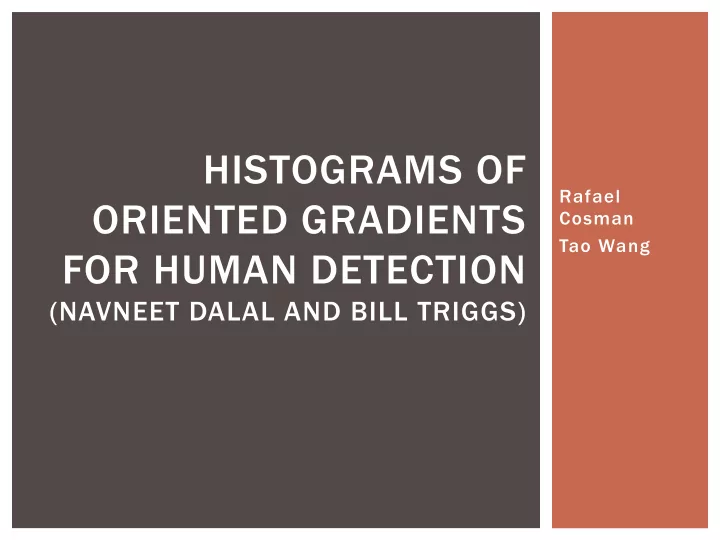

HISTOGRAMS OF Rafael ORIENTED GRADIENTS Cosman Tao Wang FOR HUMAN DETECTION (NAVNEET DALAL AND BILL TRIGGS)
HUMAN DETECTION
TRAINING SVM Descriptor HOG/SIFT/SURF… Class “Person” (x 0 , x 1 … x n ) SVM (x 0 , x 1 … x n ) Class “No Person”
TESTING: SCANNING WINDOW
TESTING SVM Result “Person” SVM (x 0 , x 1 … x n ) “No Person”
MOTIVATION ¡ Very simple to implement ¡ Performs as well or better than many descriptors ¡ Cited over 5000 times § Basis for Deformable Parts Model
(x 0 , x 1 … x n ) HOG Gradients Cells Blocks Image Descriptor
Gradients Cells Blocks Image Descriptor ¡ Convolve the image with discrete derivative mask § [-1, 0, 1] § [-1, 0, 1] T X gradient Original Image Y gradient
Gradients Cells Blocks Image Descriptor ¡ Now we count up the gradient angles in 8x8 cells § Vote weight = magnitude = √ 𝑒𝑦↑ 2 + 𝑒𝑧↑ 2 § Who you vote for ~ angle = arctan( 𝑒𝑧/𝑒𝑦 )
Gradients Cells Blocks Image Descriptor Normalization Concatenation Normalization Overlapping blocks yields better results! (Overcomplete features)
VARIATIONS Block size Cell size Unsigned Gaussian Normalization binning smoothing Alternate Circular Circular Gamma masks cells Blocks normalization Gradients Cells Blocks Image Descriptor
EVALUATION METRIC ¡ Detection task, so a single accuracy value does not make sense § Low threshold -- Low miss rate, but many false positives § High threshold – Few false positives, but misses a lot ¡ Detection E Error T Tradeoff ( (DET) Curves § Vertical Axis: Miss Rate = 1-Recall = (1 – True Pos / Total Pos in GT) § Horizontal Axis: False Positive Per Window (FPPW)
Gradients Cells Blocks Image Descriptor ¡ Using Grayscale/Color § Compute gradients in all color channels, pick the highest one § Using color gives slightly better results ¡ Gamma/Color Normalization § As a preprocessing step § Has little effect on results
Gradients Cells Blocks Image Descriptor ¡ Gaussian smoothing § Reduces performance § Fine-grained edge detection is crucial raw image σ >0 σ =0
Gradients Cells Blocks Image Descriptor ¡ Choice of masks § 1-D centered: [-1, 0, 1], [-1, 0, 1] T § 1-D uncentered: [-1, 1], [-1, 1] T § 1-D Cubic corrected: [1, -8, 0, 8, -1], [1, -8, 0, 8, -1] T § 2-D Sobel mask: [█□ −1 & 0 & 1 @ −2 & 0 & 2 @ −1 & 0 & 1 ] , [█□ −1 & 0 & 1 @ −2 & 0 & 2 @ −1 & 0 & 1 ]↑𝑈 ¡ 1-D centered [-1, 0, 1], [-1, 0, 1] T with no Gaussian smoothing works best
Gradients Cells Blocks Image Descriptor ¡ Rectangular vs Circular cells
Gradients Cells Blocks Image Descriptor ¡ Bilinear interpolation to reduce aliasing ¡ Across both orientations and locations (weighted by distance in pixels)
Gradients Cells Blocks Image Descriptor ¡ # of orientation bins § Increasing orientation bins from 4 to 9 decreases false positives by 10 times ¡ Unsigne Unsigned ce d cells lls § 0-180 degrees instead of 0-360 degrees § Actually improves performance slightly! § Why?
Gradients Cells Blocks Image Descriptor ¡ Motivation § Gradient magnitude lacks invariance to changes in illumination and foreground background contrast. ¡ Need local contrast normalization to find the “true” weight of an edge
Gradients Cells Blocks Image Descriptor R-HOG Normalization Concatenation Normalization Overlapping blocks yields better results! (Overcomplete features)
Gradients Cells Blocks Image Descriptor R-HOG versus C-HOG
Gradients Cells Blocks Image Descriptor ¡ Normalizations § L2-norm § L2-hys: L2-norm followed by clipping (limiting the maximum values of v to 0.2) and renormalizing § L1-norm: § L1-sqrt:
Gradients Cells Blocks Image Descriptor ¡ Best cell & block sizes: § Cell size of 6x6 § Block size of 3x3
VISUALIZATION AND INSIGHTS a. Average gradient over positive examples b. Maximum positive SMV weight in each block c. Maximum negative SMV weight in each block d. A test image e. It’s R-HOG descriptor f. R-HOG descriptor weighted by positive SVM weights g. R-HOG descriptor weighted by negative SVM weights
HOG COMPARED TO OTHERS
BEST SETUP Block size Cell size 3x3 6x6 No Gaussian L-2 smoothing Normalization 1-D Unsigned Overlapping Use color if centered binning blocks possible mask Gradients Cells Blocks Image Descriptor
RULES OF THUMB ¡ Abrupt edges at fine scales are essential ¡ No blurring ¡ Local contrast normalization is essential ¡ Overlapping blocks w/ “redundant” information improves results significantly. ¡ Fine orientation quantization is more important than fine spatial orientation
Recommend
More recommend